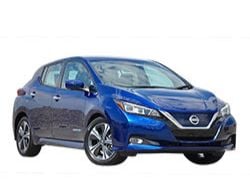2018 Nissan Leaf Pros vs Cons

What's New for 2018
The all-new 2018 Nissan Leaf will be improved in almost every conceivable way. Not only does it feature a longer range, refined styling, and updated technology, it will even have a lower starting price than its predecessor. The new Leaf is a hatchback that seats up to five, and is slightly longer, wider, and taller than the first generation model. The Lithium-Ion battery pack has been increased to 40-kWh from 30.
While the older Leaf was distinguished by its unusually pod-like appearance, the new exterior is much more mainstream, likely to appeal to a wider audience than its predecessor.
Ten Reasons You May Like the 2018 Nissan Leaf – The Pros
1. Dramatically Expanded Range
The redesigned Leaf can now travel up to 150 miles on a single charge, compared to 107 miles for the previous iteration.
2. Improved Power
In addition to the range increase, the 2018 Nissan Leaf is now more powerful. You'll get 147 horsepower--40 more than the previous model--and an impressive display of torque (237 pound-feet compared with 187 for the 2017 version) thanks to the all-electric motor. You'll enjoy a zippy 0-to-60 time of nine seconds.
3. Bold, Sporty Design
The 2018 Nissan Leaf's makeover includes Nissan's iconic V-Motion front end, with charging ports hidden behind a faux grille. The look is completed with the dark roof pillars and horizontal LED taillights.
4. Refined, Sophisticated Interior
In contrast with the hard plastics of the first-generation Leaf, the new cabin is adorned with high-quality, soft-touch materials. Choose from either a gray or black interior, each detailed with the Leaf's characteristic blue stitching.
5. Driver Assistance Technology
Driving is easier and safer than ever with the host of innovative features built into the 2018 Nissan Leaf. The car comes equipped with ProPilot Assist, which combines adaptive cruise control and lane centering systems. With e-Pedal technology, drivers can both accelerate and brake using the same pedal (though a traditional brake pedal remains for those who prefer it). Within a few years, this software is expected to evolve to add automatic lane changing and parking assistance. The Leaf marks the first time that Nissan has made its revolutionary ProPilot driving system available in the United States.
6. High-End Safety Features
The Nissan Leaf is equipped with automatic emergency braking in all trims. Drivers can opt to upgrade to the Nissan Safety Shield system, which consists of lane departure and blind spot warning, rear cross traffic alert, and surround-view camera system that detects and alerts of potential hazards.
7. Flexible Charging Options
The 2018 Nissan Leaf can be charged using a standard wall outlet, with about 16 hours needed to completely fill the battery. Upgrading to a Level 2 Volt charger cuts that time in half. With a DC fast charger, the Leaf can reach 80 percent battery life in less than an hour. Another cool feature is the Leaf-to-Home power system, which is also being introduced for the first time with the Leaf here in the U.S. This allows your home to draw energy back from the car while it's charging.
8. Plenty of Tech
When you choose a Leaf model with navigation, it also comes with both Android Auto and Apple CarPlay functionality. Leaf drivers can also download the innovative NissanConnect EV app, which allows you to remotely control your car's climate, charge it for a designated amount of time, and check your battery range before your journey.
9. Outstanding Value
With the 2018 Leaf update, Nissan has tripled the car's battery range while lowering the price. This is the first time Americans have had access to an electric car with this level of functionality at a price point under $30,000.
10. Available Luxury
An all-electric car doesn't have to be utilitarian. The 2018 Leaf comes in a fully-loaded SV version for drivers who want a little bit of luxury in the form of real leather upholstery, LED headlights and running lights, and premium seven-speaker eco-friendly sound system.
Reasons You May Not Like the 2018 Nissan Leaf – The Cons
1. Bland Handling
If you're looking for an electric car with a dynamic feel, the 2018 Nissan Leaf may not be the best choice. Reviewers describe the car's road feel as fine but uninspired (though acceleration is greatly improved over last year's model).
2. Not Enough Range for Long Journeys
If you tend to road trip, the 2018 Nissan Leaf probably isn't your best choice when it comes to electric cars. It's primarily designed as a local commuter or city driver. That said, if you have your heart set on a Nissan, the brand is set to debut a Leaf with an even longer battery range in 2019.
How it Stacks up to the Competition
While the electric car class is still relatively small in the U.S., the 2018 Nissan Leaf has a few key competitors. The Chevy Bolt EV is much more expensive than the Leaf but has a 238-mile range; the Tesla 3 is also expected to debut this year with a longer range. The Tesla is a better choice if you want an electric car with truly thrilling power. Among direct competitors like the Kia Soul EV, Hyundai Ionic, and Volkswagen e-Golf, the Leaf boasts the longest range. While these competitors are only available in select states, the 2018 Nissan Leaf will go on sale nationwide early next year.
Conclusion
With high-end styling, an expanded range, and generous tech features, the 2018 Nissan Leaf fills the ideal niche between short-range electric cars and more expensive, longer range models. This strategy allows them to appeal to new electric car drivers as well as seasoned veterans. The Leaf is designed as a high-quality, well-thought-out electric car poised to enter the mainstream.
• 2018 Nissan 370Z
• 2018 Nissan Altima
• 2018 Nissan Armada
• 2018 Nissan Frontier
• 2018 Nissan Juke
• 2018 Nissan Leaf
• 2018 Nissan Maxima
• 2018 Nissan Murano
• 2018 Nissan NV200
• 2018 Nissan Pathfinder
• 2018 Nissan Rogue
• 2018 Nissan Sentra
• 2018 Nissan Titan
• 2018 Nissan Versa

